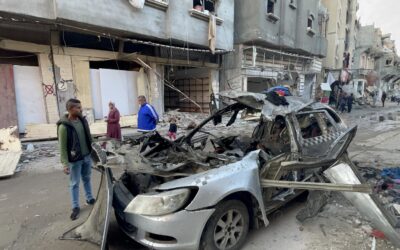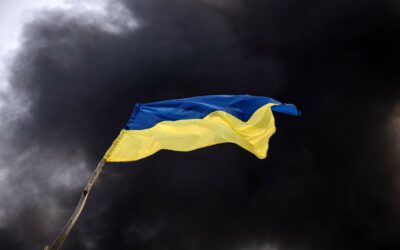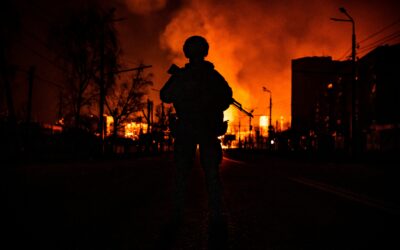
In Future Wars, Drone Weapons With Minds of Their Own
SUBSCRIBER+EXCLUSIVE BRIEFING — Drone weapons are part of the daily narrative of the war in Ukraine – from Russia’s use of Iranian drones against infrastructure […] More
Turkey has once again been very much on Europeans’ minds. This time, the issue has been about the Turkish referendum on April 16 over whether the country moves from its current parliamentary system to an executive presidency. The vote could be close, and the Turkish leader, Recep Tayyip Erdogan, needs the votes of the large Turkish diaspora in Western Europe. Countries like Germany and the Netherlands, worried about external stirring up of racial and community tensions in election years, have prevented Turkish leaders from addressing meetings in their countries. Mr Erdogan has replied pretty much as offensively as he could, with statements like “Nazism is alive in the West.”
Turkey’s geographic position, history, and relative military and economic power keep it in a pivotal place in security terms. It is a route for some people to go into Syria and fight for ISIS. It is a route for some of those who are trained, brainwashed, and brooding, to go back into Western Europe and cause mayhem. It is a route for even more victims of the Syrian conflict to safety in Europe. It is the first host for these people as they flee the fighting. As a country committed to non-negotiable borders established with the founding of the Turkish republic in 1923, it actively and nervously watches the shifts of people and territories in Syria and Iraq: above all, as these shifts might affect the aspirations of the Kurds.
It is worth stepping back to remember a few points about Turkey. First, it is and always has been part European. The historic centre of Istanbul is west of the Bosphorus, and the total size of European Turkey is bigger than some European countries. Its great founder, Ataturk, was born and raised in what is now Greece. Turkey is Islamic and mostly Asian but never underestimate the number of Turks, even now, who identify with the values and culture of Europe. The stalling of its aspiration to join the European Union may come to seem like a historic lost opportunity, for Europe and for Turkey.
The next point is that Turkey has been a pillar of NATO. It has a huge and effective army, and for all the upheavals Turkey went through during the Cold War period, it remained a dependable ally of the West against the Soviet Union. Its military top brass was close to the U.S., Germany was liked because of the large number of Turks working there, and there was a warm if discreet relationship with Israel. Many Turks feel that if the West “won” the Cold War, they are owed more gratitude than they ever received.
My third, perhaps more contentious point, is that Turkey, once the dominant imperial power in the middle-east, has no allies and has never had a successful strategy for engaging its neighbours. Turkey may blow hot and cold towards, say, Russia or Iran; but the warmer periods will never amount to a fundamental lessening of Turkish suspicions and are often more about winding up the West. The old warm relationship with Israel was in disarray by the time of the “Gaza flotilla” raid by the Israeli navy against Turkish boats in 2010, but that relationship seems to be settling down again. There will never be a warm Turkish relationship with Greece, whatever happens in Cyprus. Syria has been viewed through the prism of whether it enables Kurdish pressure on and in the Turkish state. Even we British are never allowed to forget Gallipoli in 1915.
A fourth point is that political violence has long been part of Turkish life. The PKK, the Kurdish terrorist group, attacked civilian as well as military targets in the 80s and the 90s. There have been three successful coups, one of which was followed by the execution of a civilian former prime minister, Adnan Menderes, another of which was virtually forced on the military by the violence of extreme right and left wing groups. And while terrorism continues to have successes – a shocking number over the past year or so – Turkey’s leaders are sincere when they denounce terrorism. But for all the country’s growing repressiveness under Mr Erdogan, Turkey is a tough place to police.
Finally, there is no magic key to unlocking Turkey as a strategic partner. It is as suspicious of the West as of its Arab and Iranian neighbours. It is proudly and suspiciously nationalist: even Mr Erdogan is a nationalist, far more than an Islamist. That can mean Turkey talking and acting in ways we find difficult and in resisting a helping hand just because it is foreign. It is divided culturally between the old secularist/modern Westernisers on the one hand, and those looking East on the other. It is not there to be “won over.”
But maybe we should forget about magic keys. If some Western statesmen had given the sustained attention to Turkey that they have given to other parts of the world, there would be better understanding and a more effective partnership between the West and this vital country. It is never too late to engage, eyes open but constructively. Just don’t expect miracles.
Related Articles

SUBSCRIBER+EXCLUSIVE BRIEFING — Drone weapons are part of the daily narrative of the war in Ukraine – from Russia’s use of Iranian drones against infrastructure […] More

SUBSCRIBER+ EXCLUSIVE ANALYSIS — Iran’s retaliatory strikes against Israel this weekend were both a potentially game-changing, historic first — and an underwhelming response. Historic, because […] More

SUBSCRIBER+EXCLUSIVE INTERVIEW — Ukraine was hit by a fresh round of Russian missile attacks on Thursday, strikes that targeted and damaged the country’s power grid […] More

SUBSCRIBER+ EXCLUSIVE REPORTING — The Israeli drone strike that killed three adult sons (who Israel says were Hamas operatives) and four grandchildren of Hamas’s Qatar-based […] More

BOTTOM LINE UP FRONT – In the spring of 2022, Ukraine beat back a Russian assault on the nation’s capital and punished the invaders on […] More

SUBSCRIBER+EXCLUSIVE — The Ukraine war has reached a “pivotal moment,” a “critical stage,” an “inflection point“ – all phrases used to describe the current situation […] More
Search